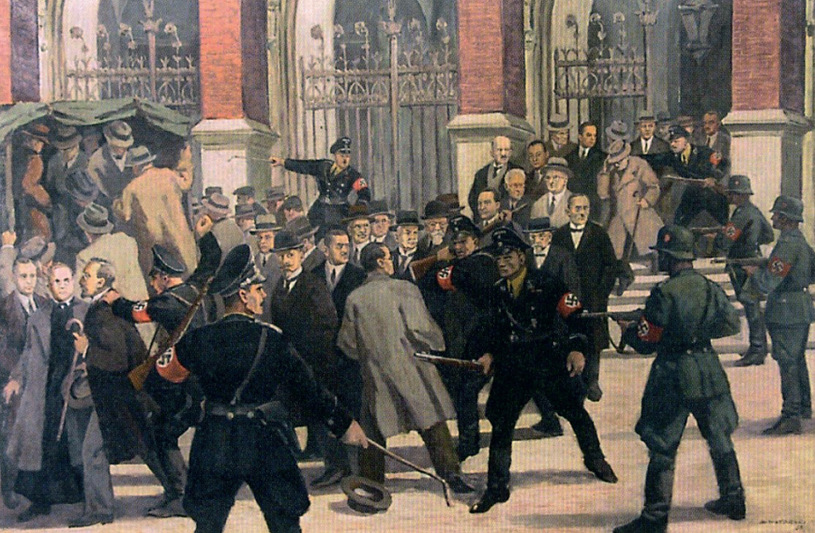6 November 1939 the Germans arrested 183 Polish professors and other scientists in Krakow. Most of them were transported to the German camp at Sachsenchausen. Some of them did not survive their detention there.
After the Third Reich’s aggression against Poland, Krakow was occupied by the Germans on 6 September 1939. From the very beginning, the occupiers used terror against the city’s inhabitants. According to Nazi policy, Poland was to be a reservoir of cheap or even free labour, essential for the functioning of the war machine. Part of the Polish territories occupied by the Third Reich were directly incorporated into it, and from the rest, in October 1939, they established the General Governorate (GG). This quasi-state was headed by Hans Frank. Krakow had been the capital of Poland for many years before Warsaw and was designated as the seat of the occupation authorities. The oldest Polish university, the Jagiellonian University (UJ), which for centuries had been educating successive generations of Poles and employing many outstanding and internationally respected scientists, had also functioned in this city since 1364.
In the second half of October 1939, the university administration decided to reopen the University, deciding that the commencement of the new academic year would take place on Monday, 6 November (the date was later moved by a week to 13 November). The inauguration was to be traditionally preceded by a Mass celebrated on 4 November in the academic church of St Anne. The rector of the Jagiellonian University, Professor Tadeusz Lehr-Spławiński, informed the occupying commissar of the city, Ernst Zörner, who was in office since 27 September 1939, and did not oppose the plans.
However, an entirely different stance was taken by Bernhard Rust, the German Minister of Science, Education and Science, who, in a letter dated 31 October 1939 and addressed to the Governor General Hans Frank, obliged him to completely prevent the resumption of classes at the Jagiellonian University. In order to achieve this, the Germans decided to arrest professors and other university staff. They did this as part of an operation that was later called Sonderaktion Krakau by historians, while the occupiers themselves called it Aktion gegen Universitäts Professoren, as this was the basis for the arrests they wrote in the prisoners’ files.
On 3 November 1939, Professor Tadeusz Lehr-Splawinski was met by SS officer Bruno Müller, who instructed the rector to organise a meeting with the university staff on 6 November. Müller was to give a lecture on German attitudes to science and higher education. The rector, not sensing a ruse, hastily notified the university’s scientific staff of the date of the meeting.
During the war effort in September, the SS man was commander of Einsatzkommando 2/I, a unit operating at the rear of the front in Upper Silesia and Lesser Poland. Its members were responsible for the murder of the Polish intelligentsia based on proscription lists in Upper Silesia. Müller was also later personally involved in the extermination of the Jewish population. After the end of the Second World War, he was arrested by the British and sentenced to 20 years in prison, but he was released in 1953 and did not account for most of the crimes he committed.
Müller’s lecture was scheduled to take place on 6 November 1939 in lecture room 66 of the Colegium Novum of the Jagiellonian University. The university’s buildings had previously been surrounded by German security forces, and many SS officers were in the building. Punctually at 12.00, Bruno Müller entered the hall and made a short announcement. This is how its contents were remembered by the lecturers present in the auditorium: “The university here has started the academic year without obtaining permission from the German authorities. This is ill-will. Moreover, it is well known that the lecturers have always been hostile to German science. For this reason, all of you, except for the three women, will be transported to a concentration camp. Any discussion or even any statement on the subject is excluded. Whoever resists the execution of my order will be shot”.
At a signal given by Müller, SS officers entered the auditorium and began to lead out the scientists. Some of them tried to protest and make statements. However, this was met with a brutal reaction from the Germans, who, among other things, slapped and kicked 70-year-old Professor Stanisław Estreicher, former rector of the Jagiellonian University.
As a result of the Sonderaktion Krakau, the Nazis detained 183 people, mostly the Jagiellonian University employees. The arrested researchers were also from other universities in Krakow, but also from the Stefan Batory University in Vilnius or the Catholic University of Lublin. They included many internationally respected scientific professors.
The detainees were taken to a prison on Montelupich Street in Krakow, then imprisoned in the former military barracks on Mazowiecka Street. At the end of November 1939, they were taken to the Sachsenchausen camp near Berlin. There they met Rudolf Höss, who was then the head of this camp. Höss became commandant of the newly established Auschwitz concentration camp in the spring of 1940. As a result of diplomatic pressure and appeals from foreign academic circles, the Germans released the professors born before 1900 in February 1940; some of the others were transferred to Dachau Concentration Camp, from where they were successively released. Unfortunately, 20 of them did not survive to be free. Among others, the aforementioned Professor Estreicher and many others died in KL Sachsenhausen in December 1939. The Germans later murdered Professors Leon Sternbach and Joachim Mettalmann, who were of Jewish origin.





